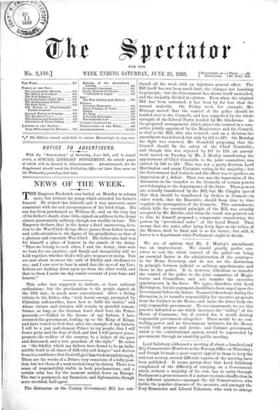The discussion on the County Government Bill has con- tinned
all the week, with an injurious general effect. The Bill itself has not been much hurt, the changes not touching its principle ; but the Government has shown itself undecided, and the majority divided in opinion. Even when the original Bill has been sustained, it has been by far less than the normal majority. On Friday week, for example, Mr. Henea.ge moved that the control of the police should be handed over to the Councils, and was supported by the whole strength of the Liberal Party, headed by Mr. Gladstone. As the proposed arrangement, which places the control in a com- mittee jointly appointed by the Magistrates and the Council, is vital to the Bill, this was resisted ; and on a division the amendment was defeated, but only by 264 to 218. On Monday the fight was renewed, Mr. Stansfeld proposing that the Council should fix the salary of the Chief Constable ; and though this was rejected by 161 to 120, an amend- ment moved on Tuesday by Mr. J. Morley, transferring the appointment of Chief Constable to the joint committee, was carried by 246 to 216. This was not a party division, Lord Hartington and many Unionists voting in the majority ; but the Government had resisted, and the effect was to produce an impression of a defeat. That, too, was the impression of the discussion on the transfer to the Councils of certain powers now belonging to the departments of the State. These powers are actually transferred by the Bill, but Mr. Chaplin moved that they should be transferred by Orders in Council,—in other words, that the Executive should from time to time regulate the prerogatives of the Councils. This amendment, which kills the essential principle of the Bill, was actually accepted by Mr. Ritchie, and when the result was pointed out to him, he himself proposed a compromise transferring the powers by "provisional order" of the Local Board. That means that the order, after lying forty days on the tables of the Houses, shall be final, and is so far better ; but still, it leaves to a department what Parliament ought to decide.






































